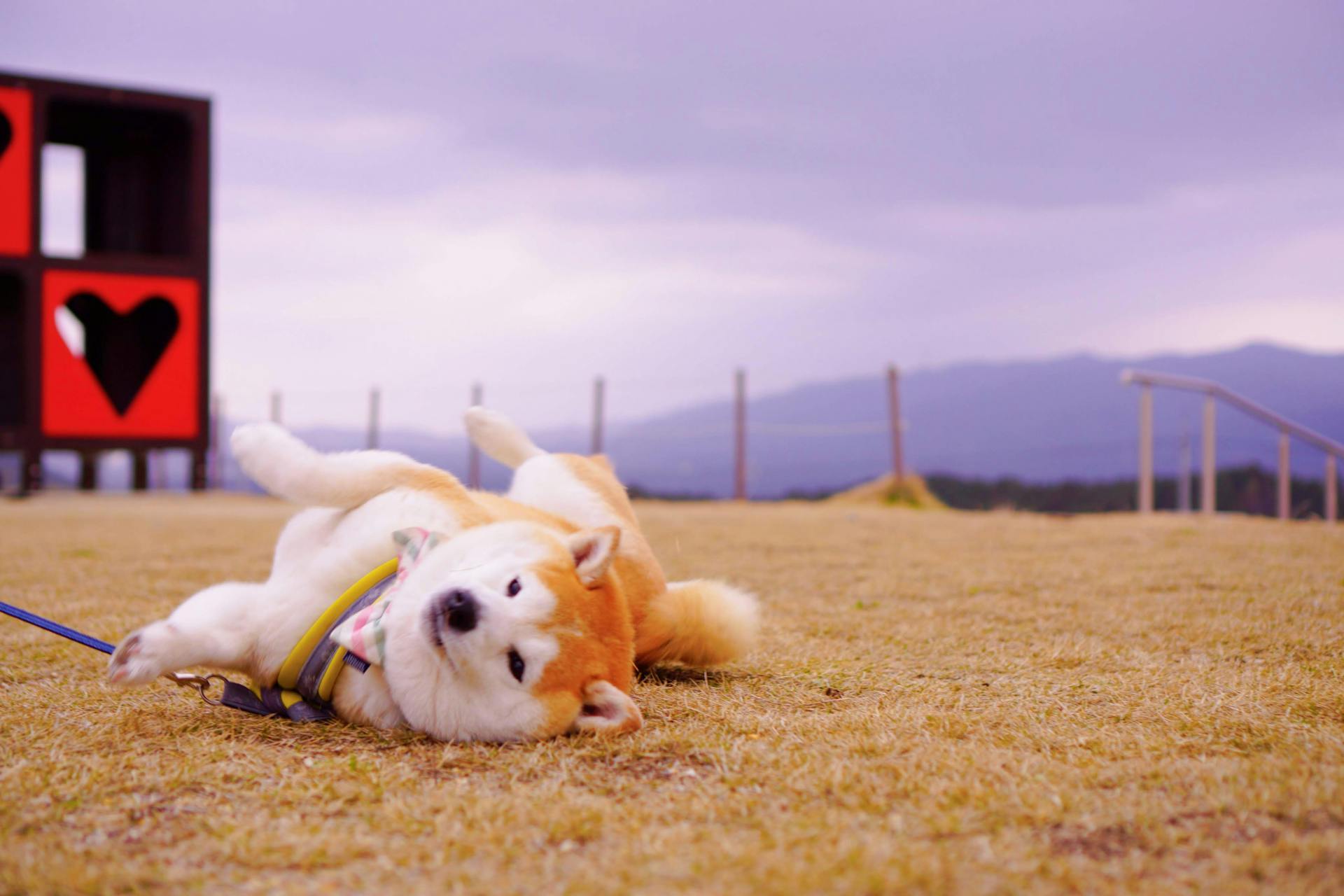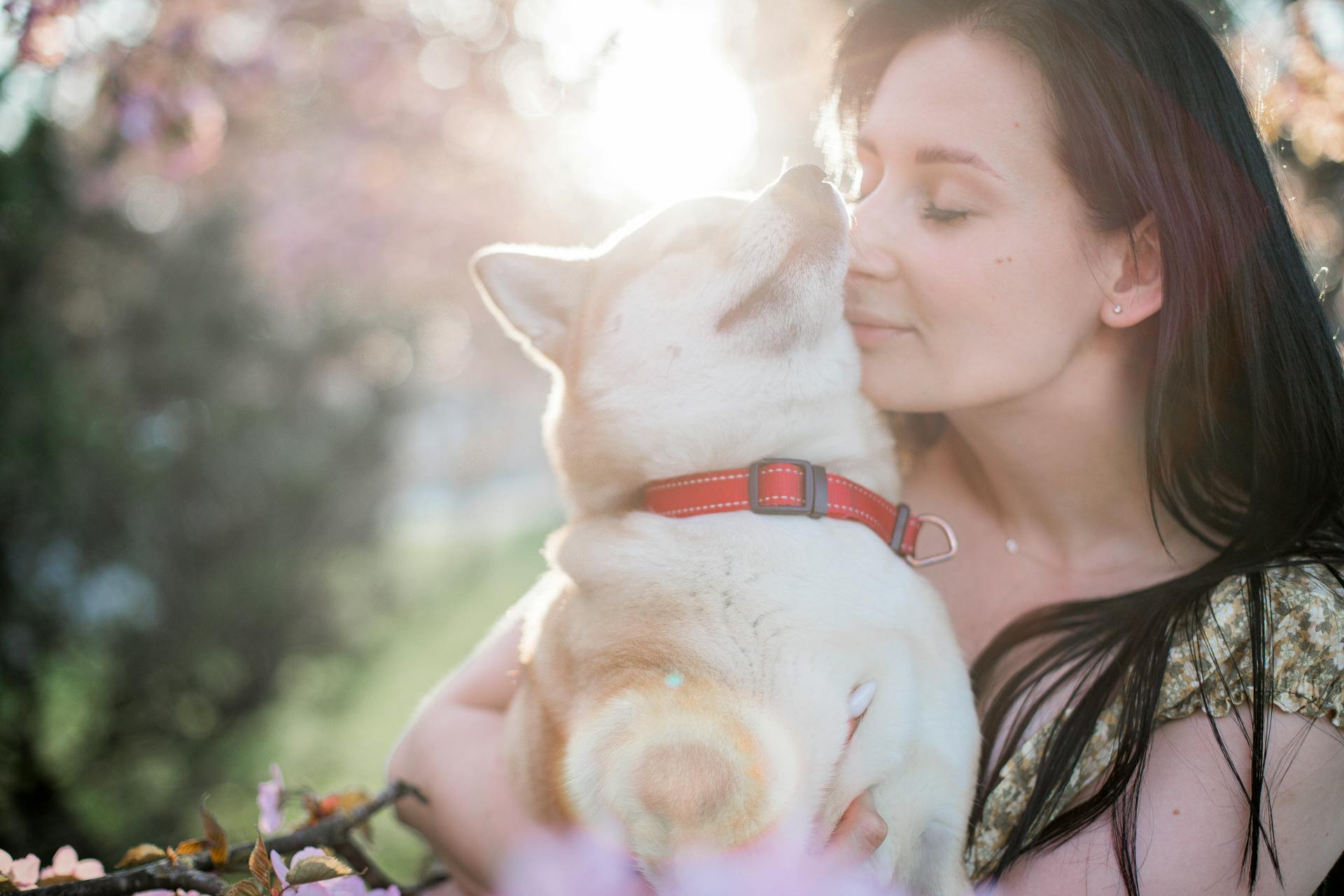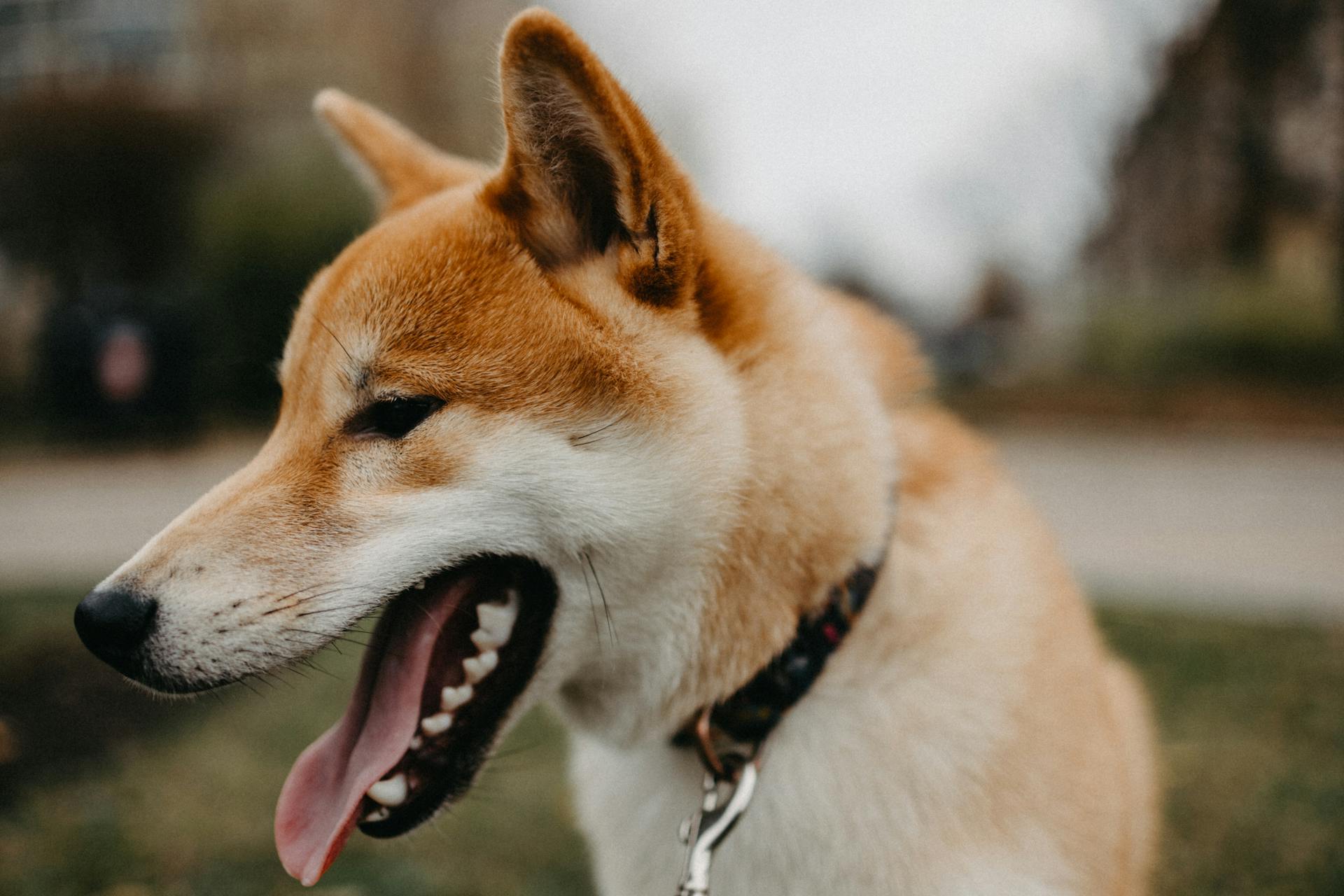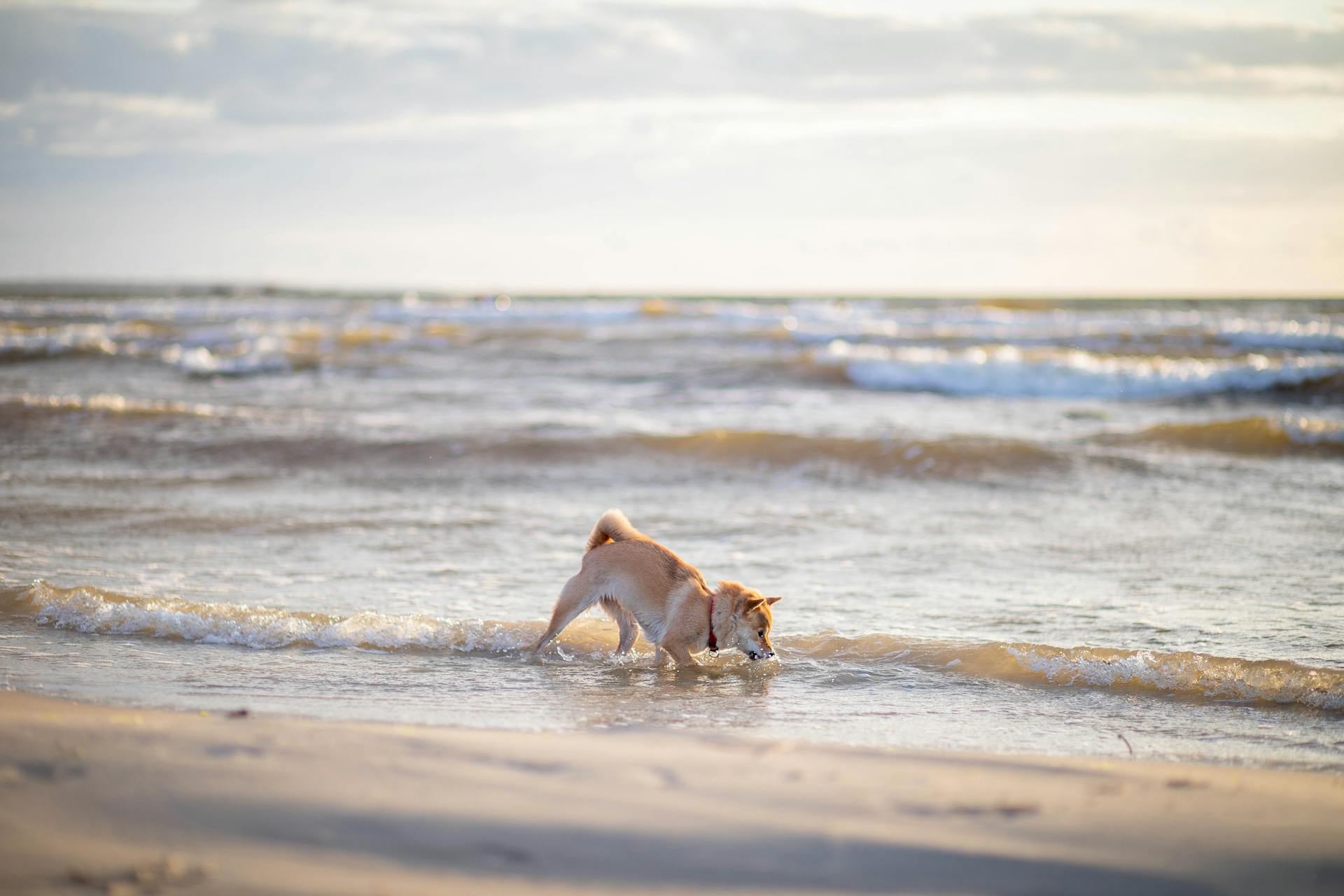
Shiba Inus are known for their strong will and independent nature, which can sometimes be misinterpreted as stubbornness. They have a unique genetic makeup that predisposes them to be more resistant to training.
Their ancestors, the ancient dogs of Japan, were bred for hunting and guarding, not for obedience. This history has left a lasting impact on their temperament.
Shiba Inus are naturally wary of strangers and may take time to warm up to new people and environments. This is a result of their strong prey drive and hunting instincts.
Building trust with your Shiba Inu takes patience and consistency, as they can be easily spooked by sudden movements or loud noises.
Understanding Shiba Inu Temperament
Shiba Inus are known for their strong will and independent nature, making them a challenging breed to train. They have a dominant side to their personality that can become a problem if left unchecked.
Setting boundaries early on is crucial with a Shiba Inu, as they need to know who's in charge. Adopting an unaggressive alpha role is essential to establish a sense of hierarchy and respect.
Their strong prey drive and hunting instinct mean they're best kept on a lead, especially when in the presence of wildlife. This is due to their independent streak and tendency to follow their own instincts.
Shiba Inus are intelligent dogs that don't follow commands blindly unless it makes sense to them. They're known to be fastidious with themselves, often finding their own ways to keep themselves clean and neat.
A Shiba Inu's stubborn trait can be seen in their ability to fight back fiercely when they feel frightened, and they won't surrender even when all is lost. This trait makes training a challenge, requiring consistency, firmness, and patience.
Here are some key characteristics of a Shiba Inu's temperament:
- Confident, loyal, and lively
- Independent and territorial
- Strong prey drive and hunting instinct
- Stubborn and strong-willed
- Intelligent and fastidious
These traits make Shiba Inus a great choice for experienced dog owners who are looking for a loyal companion, but may not be the best fit for first-time owners or families with young children.
Curious to learn more? Check out: Shiba Inu with Owner
Training and Socialization
Training a Shiba Inu requires patience and consistency as they are known to be stubborn at times. They can be relatively easy to train, but their strong-willed nature means they tend to lose focus and test boundaries.
A Shiba Inu needs between 40 and 60 minutes of exercise every day to satisfy their energetic and active personalities. This should include off-lead activity in a safe and enclosed area, such as a secure garden or open space.
To prevent destructive behavior, Shibas need plenty of mental stimulation and exercise. They have a potential for destructive behavior if they become too bored and inactive, so indulge their playful side with toys and games.
Here are some tips for training and socializing your Shiba Inu:
Eye Contact
Eye contact is a crucial aspect of building mutual respect and understanding with your dog.
Make your dog look at you before giving any command. A simple example is playing fetch, where you don't throw the ball unless your dog looks at you first.
Praise your dog whenever he looks at you, so he learns to look at you for directions. This will help him develop the habit of looking at you more often.
Training a Shiba Inu for eye contact is not an easy task, but consistency and firmness on the command will yield results.
You might like: Will Shiba Inu Hit $1
Raising a
Raising a Shiba Inu requires a lot of patience and understanding, as they are a very sharp and agile breed that never seems to lose energy.
Their self-dependent nature means they need a lot of communication and training from a young age to nurture them in the right way.
Training a Shiba Inu dog can be challenging due to their stubbornness or freethinking, and they only tend to follow when they want to.
It's essential to start training early, but don't expect immediate results - some puppies may take a while to master specific things.
One of the most critical periods for development is the first year, when socialization is crucial to prevent potential dog aggression later on.
Socializing your Shiba Inu with many dogs and humans is key to raising a well-balanced and happy dog.
Taking your Shiba Inu to the dog park at least once a week can help them become comfortable around other dogs and humans.
Consistently enforcing the rules of the house is also essential to keeping a clean and healthy Shiba Inu, as they can be prone to being a bit unruly.
Socialization Training
Socialization training is crucial for Shiba Inus, as they can be aggressive if not socialized properly. Shibas must be exposed to various environments, people, and objects to become tolerant and well-balanced adults.
To socialize your Shiba, start early, ideally after they've finished their puppy vaccinations. This is the critical period for development, and socialization will help prevent potential dog aggression later on.
Socialization can be done by taking your Shiba to the park or dog-friendly areas, where they can interact with other dogs and humans. In fact, other dogs can be the best trainers for socialization, as they can help your Shiba learn how to behave around others.
Here are some tips for socializing your Shiba:
- Take your Shiba to the park or dog-friendly areas at least once a week.
- Expose your Shiba to various environments, people, and objects.
- Start socialization early, after your Shiba has finished their puppy vaccinations.
- Use other dogs as trainers for socialization.
By following these tips, you can help your Shiba become a well-balanced and happy adult, with a strong social foundation.
Care and Management
Shibas require regular exercise to stay happy and healthy. Between 40-60 minutes of exercise is recommended each day.
To keep your Shiba entertained and avoid boredom, provide plenty of mental stimulation. This can be achieved through playtime, training sessions, and interactive toys.
Establishing an alpha role early on is crucial to prevent your Shiba from becoming an expert escape artist. Make sure to secure any gardens to prevent them from testing your boundaries.
Here's a quick rundown of Shiba-specific exercise needs:
- Duration: 40-60 minutes per day
- Frequency: Daily
- Additional tips: Provide mental stimulation through playtime, training sessions, and interactive toys
Grooming
Grooming is a crucial part of Shiba Inu care and management. Regular grooming can help prevent matting and tangling of their thick double coat.
Shibas need weekly brushing to keep their coat tangle-free and healthy. This should be done with a soft-bristled brush or a slicker brush specifically designed for double-coated breeds.
Their coats come in four recognized colours: red, white, sesame, and black and tan. These colours can vary in intensity and shading.
Shibas are a heavy shedding breed, so be prepared for lots of hair around the home. They tend to shed year-round, but more heavily in the spring and autumn.
Regular brushing is needed to remove dead hair and prevent matting. This will also help reduce the amount of loose hair in the home.
Shibas are considered a very clean breed and often self-groom in a similar way to a cat. This can be a sign of their good health and hygiene.
Oral hygiene should be consistent to prevent tooth or gum issues. Ears should also be checked regularly for any build up of wax that could lead to infection.
Take a look at this: Grizzle Border Terrier Colours
Nutrition
Your Shiba Inu's nutrition plan should be tailored to their small but active nature, helping them maintain a healthy weight.
Shibas are notoriously food motivated, so it's essential to choose high-quality food in the right portions to avoid overfeeding.
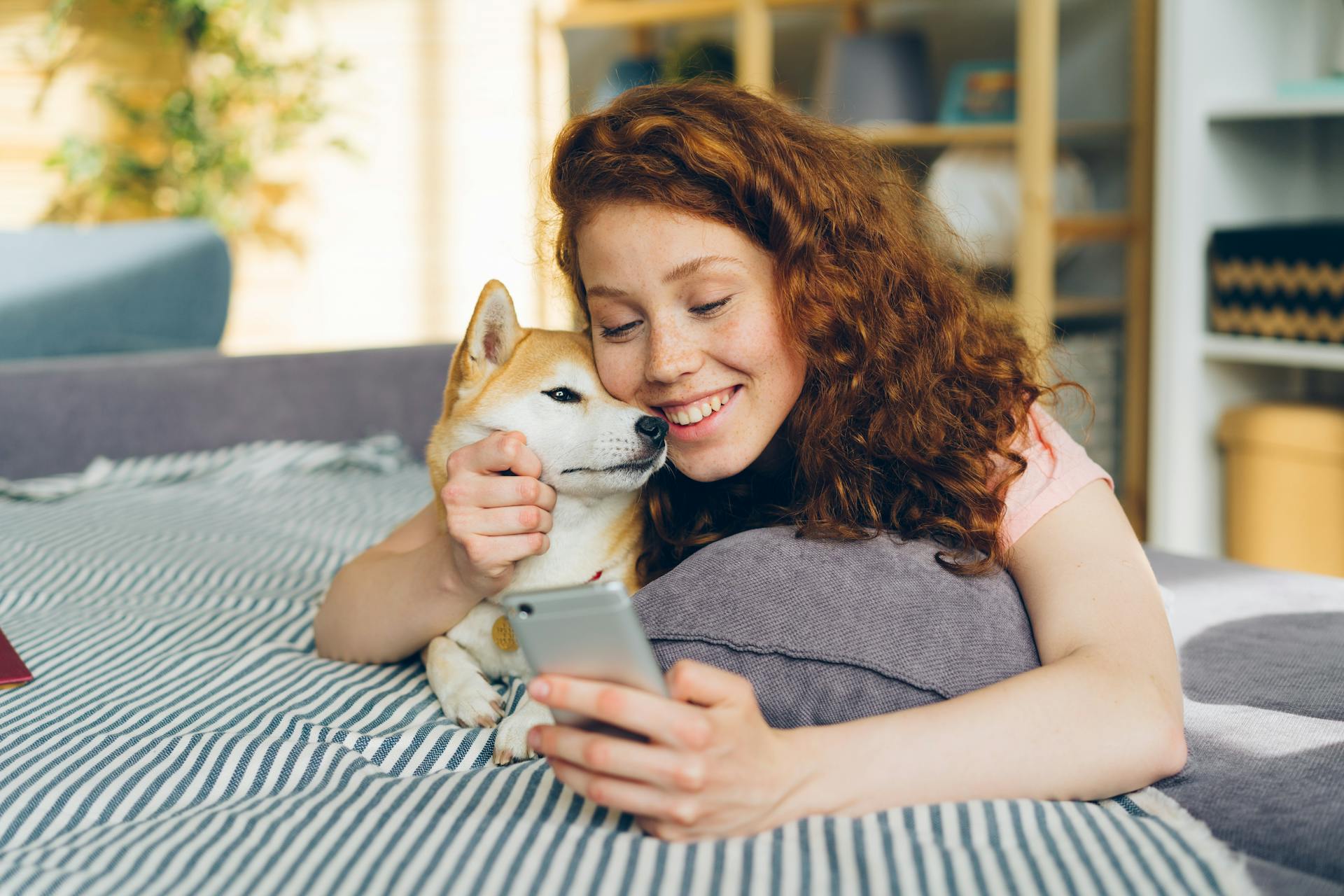
A balanced diet of good quality, dry dog food is the way to go, containing all the necessary minerals and proteins.
Shibas thrive on regular, measured meals to maintain a healthy weight and compact body shape.
To ensure you're feeding your Shiba correctly, measure out their food to avoid overfeeding, and choose a good quality dry dog food that meets their nutritional needs.
Here are some key things to consider when selecting your Shiba's food:
- Good quality food in the right sized portions
- A balanced diet with necessary minerals and proteins
Before Buying or Rehoming a Pet
Before buying or rehoming a pet, it's essential to consider their needs and your lifestyle. A Shiba Inu, for example, requires between 40-60 minutes of exercise daily, so if you're an active person, this breed might be a great fit. However, if you're not prepared to provide regular exercise and mental stimulation, a Shiba Inu may not be the best choice.
Shibas are known for their strong bond with their owners, but they can be independent and stubborn, making them best suited for experienced owners or families with older children. This means you'll need to establish a clear alpha role early on to avoid any unwanted behavior.
Suggestion: Shiba Inu Exercise Needs
To ensure a smooth transition, research the breeder or rescue organization thoroughly. With the implementation of 'Lucy's Law', new puppies must be bought directly from a breeder or adopted from a rescue, and third-party sellers are now illegal.
Here are some key things to consider before bringing a pet into your home:
- Exercise needs: Shibas require 40-60 minutes of exercise daily
- Training: Establish an alpha role early on to avoid unwanted behavior
- Breeder or rescue: Research thoroughly and ensure you're buying or adopting from a reputable source
- Grooming: Be prepared for regular grooming and cleaning up excess hair
Remember, getting a pet is a big responsibility, and it's crucial to consider whether a canine friend is the best fit for you before making the leap from dog lover to dog owner.
Crate Training Basics
Crate training can be a great way to provide your Shiba Inu with a safe space to relax and feel secure. Shiba Inus are highly intelligent and can get bored easily, so mental stimulation is key.
A crate can help prevent destructive behavior around the home by giving your Shiba a quiet place to retreat to when they're feeling overwhelmed. With their strong-willed nature, Shibas can sometimes test the boundaries of what they can get away with, so a crate can help with recall training.
To make crate training work for your Shiba, it's essential to introduce it gradually and make it a positive experience. Start by placing treats and toys inside the crate to entice your Shiba to enter voluntarily.
Here are some tips to keep in mind when crate training your Shiba:
- Provide plenty of exercise and mental stimulation to prevent boredom and destructive behavior.
- Involve your Shiba in games and activities that challenge their problem-solving skills, such as hiding food treats around the garden.
- Make sure your Shiba has access to a secure, enclosed area for off-lead exercise and exploration.
- Be patient and consistent when introducing the crate, and reward good behavior with treats and praise.
Dog Crate Options
Choosing the right dog crate is crucial for a safe and comfortable space for your furry friend.
A wire crate is a popular option, offering good ventilation and visibility.
These crates are usually made of durable metal and come with a removable top for easy cleaning.
Plastic crates are another great option, often preferred for their easy setup and portability.
These crates are lightweight and can be used for travel or in small spaces.
Soft-sided crates provide a more cozy and flexible option, often used for puppies or senior dogs.
They are usually made of durable fabric and come with a sturdy frame for support.
For more insights, see: What Is Shiba Inu Coin Used for
Positive Training Methods
Shiba Inus are highly intelligent dogs that thrive on mental stimulation, so it's essential to engage their minds as well as their bodies through play and exercise.
To avoid boredom and destructive behavior, Shibas need plenty of mental stimulation, which can be achieved through toys, games, and problem-solving activities.
A simple reward like "Good job!" or a few treats can go a long way in encouraging good behavior and strengthening the bond between you and your Shiba.
Here are some effective positive training methods to try:
- Praise your Shiba frequently for good behavior, using consistent and positive language.
- Use rewards like treats, walks, or playtime to motivate good behavior.
- Be patient and consistent in your training, as Shibas can be stubborn at times.
Remember, every Shiba is different, so it's essential to tailor your training approach to your dog's unique needs and personality.
Rewards and Praises
Giving your dog simple praise like "Good job!" can make a big difference in their behavior.
Telling your dog "Good job!" consistently will help them understand what they're doing right.
Use rewards like your dog's favorite treats or a walk in the park to make them look forward to doing things right.
Simple rewards can be very appreciated by Shiba Inu dogs, especially since they're highly energetic and love long walks.
Treats should be used sparingly and purposefully, and only given when your dog earns them, not just because they stare at you with cute eyes.
Giving your dog rewards and praise every time they enter the crate will encourage them and help them understand they're doing the right thing.
Only Allow OK Play
Shiba Inus are intelligent breeds that can get bored easily, so it's essential to provide them with plenty of mental stimulation to avoid destructive behavior.
A Shiba Inu will need between 40 and 60 minutes of exercise every day to satisfy their energetic personalities.
To keep your Shiba Inu engaged, try hiding food treats around the garden for them to find, or play ball games that will challenge their problem-solving skills.
Shibas love to chase and will enjoy trying to catch water from a hosepipe on a hot summer day.
A different take: Will Shiba Inu Reach $1 Cent by 2025
Here are some tips to keep your Shiba Inu's playtime positive:
If you see a behavior starting that's not okay, immediately discipline your dog. Don't let them continue doing something wrong just because they look cute or will eventually grow out of it.
Discipline and Boundaries
Disciplining your Shiba Inu is crucial because they need to know that there are limits to their freedom and that their actions have consequences. They need to understand that what they're doing is not right.
Discipline is a key factor to a great house-trained dog, and it's essential for Shiba Inus, who are known to be a bit stubborn. They're highly intelligent, but they still need to be taught the principles of discipline.
Building a connection with your Shiba Inu is vital, so they can start trusting you. You just need to be very patient and understanding with this breed.
Never punish your Shiba Inu physically, as this can cause severe pain and fear. Instead, always treat them like family and try to keep yourself in a calm state.
You should never shout at your Shiba Inu, as they can differentiate between your normal voice and yelling voice. Yelling can even agitate or excite them, causing negative behaviors.
Importance of Discipline
Disciplining your dog is essential because all the training you do won't work if your dog doesn't understand what's right and wrong. Your dog needs to know there are limits to his freedom and that he can't do everything he wants without restriction.
Disciplining your dog teaches him that his actions have consequences, and with the right approach, he'll learn to behave properly and obey commands. A well-disciplined dog is less likely to have accidents or ruin your place.
Shiba Inus, in particular, require the right discipline approach due to their stubborn nature. They're intelligent dogs, but they need to be taught discipline principles. Building a connection with your Shiba Inu is crucial, so be patient and understanding.
Disciplining your dog doesn't mean punishing him physically, which can cause pain and fear. Instead, use calm, consistent methods to teach him what's right and wrong. A calm state of mind is essential for effective training.
Shouting at your dog is never a good idea, as it can confuse and even agitate them. Instead, use a calm, firm tone to communicate what you want. A simple "NO" or clapping can be effective in getting your dog's attention.
Teaching your Shiba Inu not to bite is crucial, as it can be a challenging habit to break. Start by teaching bite inhibition, and reward good behavior. If your puppy bites hard, try putting him in his crate or using a negative reinforcement like a light tap on the back.
How to Discipline Your Child
Discipline is not about punishing your child, but about teaching them right from wrong. According to the American Academy of Pediatrics, discipline should be a positive and supportive process.
Setting clear boundaries is essential for effective discipline. Children thrive on routine and predictability, so establishing consistent rules and consequences helps them feel safe and secure.
Research suggests that children who are given choices and encouraged to make decisions are more likely to develop self-discipline. This is because they learn to weigh the pros and cons of different options.
Time-outs can be an effective way to help children calm down and reflect on their behavior. However, it's essential to keep the time-out short and to the age of the child, as excessive time-outs can lead to feelings of frustration and anger.
Consistency is key when it comes to discipline. Children need to know that the rules apply equally to everyone in the household, including parents and siblings.
Positive reinforcement is a powerful tool for encouraging good behavior. By praising and rewarding desired actions, you can help your child develop a sense of self-worth and motivation.
Consider reading: First Time Boarding My Dog
Sources
Featured Images: pexels.com
